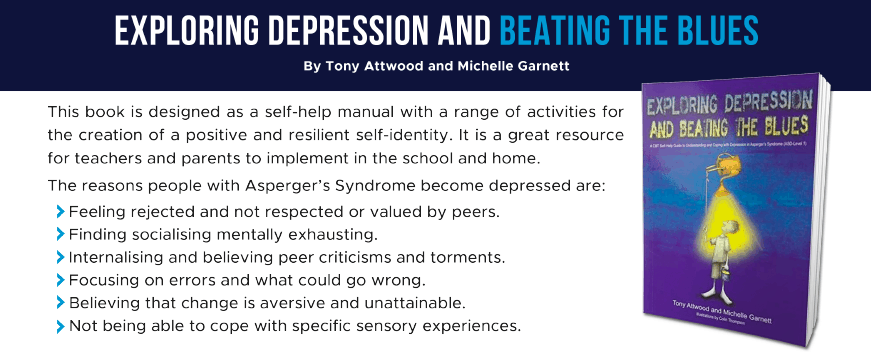UNDERSTANDING MENTAL HEALTH & ASD
Recognising and exploring the relationship between ASD and mental health difficulties is vital, so each can be addressed successfully.
As Tony Attwood said “people with Asperger’s Syndrome appear especially vulnerable to feeling depressed, with about one in three adolescents and two out of three adults with Asperger’s Syndrome having experienced at least one episode of severe depression in their life”.
(Page 10 of Exploring Depression, and Beating the Blues by Tony Attwood and Michelle Garnett).

MENTAL HEALTH AND AUTISM
TIPS FOR INDIVIDUALS ON THE AUTISM SPECTRUM
By Yenn Purkis (previously known as Jeanaette Purkis)
UNDERSTANDING ALEXITHYMIA
Many people on the Autism Spectrum have ‘Alexithymia’. Also known as emotion blindness. Essentially this means that they find it hard to understand what emotion they are experiencing. They might know that they feel ‘bad’ or ‘scared’ but not be able to elaborate further than that. If you know anyone who experiences alexithymia, it can help for them to write down what they are feeling in their body, in other words what they feel like doing (such as ‘I feel like running away’ or ‘I want to get in bed and hide under the covers’) and relay these to their mental health worker.
GETTING A DIAGNOSIS
Although, mental illness and Autism are two separate entities they tend to impact dynamically on one another. People on the Autism Spectrum can experience all the same mental health conditions. However, mental illnesses can present differently in those on the Autism Spectrum which often can result in harmful misdiagnoses and inappropriate treatments.
STRATEGIES FOR MENTAL HEALTH CRISES
Mental health crises** can be intense and overwhelming, sometimes resulting in self-injurious behaviour or extreme emotions. It is important to learn some strategies for managing a crisis when it happens. For example:
- DISTRACTION is a very helpful technique for managing mental health symptoms and crises. Distraction involves focusing on an activity they enjoy in order to distract their mind from mental health distress. This is not a permanent fix and you may need to distract several times over the course of a day. Perhaps make a list of distractions that you have been found to be helpful and refer to this list when required.
- MINDFULNESS and other related techniques can be very helpful. In essence, mindfulness involves viewing emotions and mental health distress as things which are fleeting. Mindfulness practice focuses on being aware of the present moment – not dwelling on the past or worrying about the future. There are some great apps too that can be very helpful to support mindfulness.

FINDING A PSYCHOLOGIST
The most important thing you can do is find a psychiatrist, psychologist or other mental health worker. This is a long term solution where this person will provide a number of solutions and strategies to dealing with tough times.
FINALLY REMEMBER
Many people have a mental health condition as well as Autism. While more needs to be done, understanding around Autism and mental illness is growing. You can find some more useful strategies for managing and supporting people with mental health issues in these great books.
- The Guide to Good Mental Health on the Autism Spectrum (Jeanette Purkis (aka Yenn), Dr Emma Goodall & Dr Jane Nugent), RRP $39.95
- The Parents’ Practical Guide to Resilience for Preteens and Teens on the Autism Spectrum (with Dr Emma Goodall) $32.95.
- The Practical Guide to Resilience for Parents of Autistic Children aged 2-10 years, Jeanette Purkis (aka Yenn) & Dr. Emma Goodall $32.95.
- Finding a Different Kind of Normal: Misadventures with Asperger’s Syndrome, Jeanette Purkis (aka Yenn) $39.95.




 Sorry we no longer ship items outside Australia. Please consider the digital versions of Sue’s Books –
Sorry we no longer ship items outside Australia. Please consider the digital versions of Sue’s Books – 